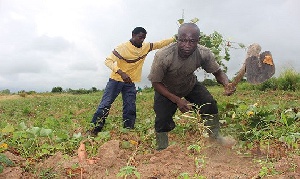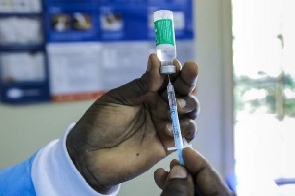The production of sweet potato in Ghana is less than 20 percent of targeted production levels, mainly hindered by perception that the crop is food for poor people.
But the role of sweet potato is becoming more important and substantial in fostering household food and nutrition diversification.
The orange-fleshed sweet potato varieties, for instance, can contribute to combating Vitamin A deficiency and can also serve as wheat flour substitute in processed products.
Interest groups in food and agriculture want sweet potato to be seen as the next crop the country should be projecting, due to the potentials in food security and industrial value addition, as well as its growing export demand.
“If you link up the future of potato and starch in general to the car industry, you realize that even an over production can be mopped up by the vehicle industry, because they can use most of that material to build the dashboards that you so comfortably want to sit in,” Joseph Faalong, a director at the Ministry of Food and Agriculture said.
He, however, underscored the need to raise the productivity of potato higher, by creating interest in the business potentials of sweet potato production, especially among the youth.
“To do potato on a large scale, we need to devise mechanisms for lifting the crop. If we as researchers can look more into mechanical harvesters, machinery that can lift the crop on a large scale, then we’ll be doing a lot of justice to productivity,” he added.
The International Sweet potato Centre (CIP), in collaboration with the Kwame Nkrumah University of Science and Technology (KNUST) and the Council for Scientific and Industrial Research (CSIR), is running a training of trainers’ course on “Everything You Need to Know About Sweet Potato”.
Project Coordinator, Dr. Ibok Oduro of the KNUST, noted there are business opportunities along the sweet potato value chain; from planting to marketing and processing of the crop.
“Sweet potato gives a variety of avenues for people to create business and that is why we think the training of trainers will empower them to be able to do such things,” she said.
She added breeders are developing seed varieties that are resistant to diseases and also looking at machines for peeling sweet potatoes for industrial attraction. The Crops Research Institute (CRI) of the CSIR has developed and released 12 high yielding sweet potato varieties, which yield 2-3 times higher than the traditional varieties.
Dr. Oduro is encouraging Ghanaians to particularly look at potato leaf production as a viable agricultural venture. “With sweet potato, within four months to five months you harvest; so it means three times in a year, you have something to sell… the leaf is very rich in anti-oxidants,” she said.
CIP has been working to promote sweet potato in Ghana, through partnerships with local institutions on post-harvest handling, techniques in breeding systems “Sweet potato was an orphaned crop but now with the training, we are opening the mind of people on how we can use and harness sweet potato like other crops,” said Putri Ernawati Abidin, Project Manager at the International Potato Centre (CIP).
In Ghana, CIP has set a goal of reaching nearly 500,000 households with resilient nutritious sweet potato by 2020.
Business News of Wednesday, 24 May 2017
Source: 3news.com
Ghana set to make sweet potato the next food security crop
Entertainment












